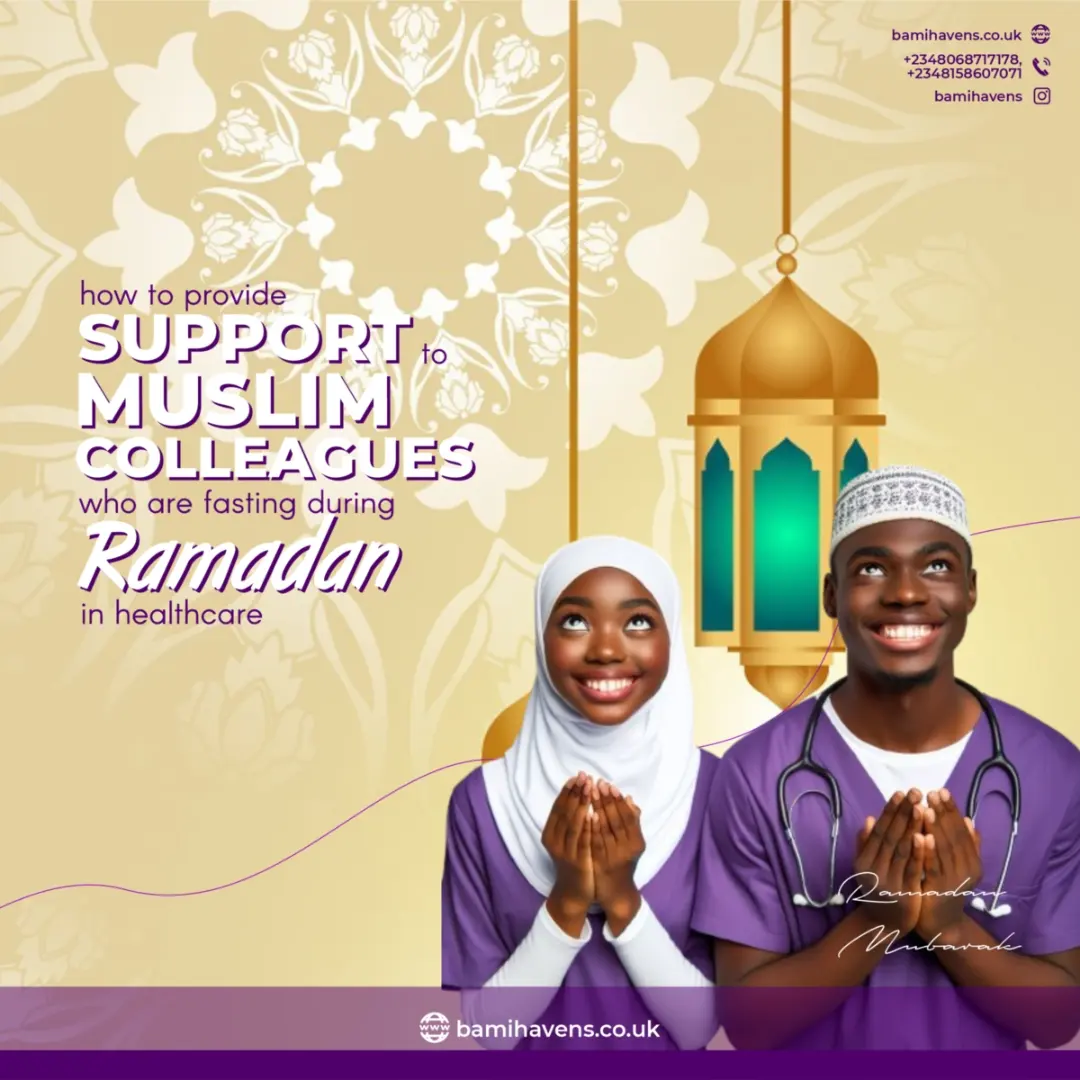Introduction
Ramadan, the ninth month of the Muslim calendar, is the most sacred month. The holy Quran was believed to have been sent down from heaven as a guide for the young and old.
This is marked by Muslims fasting from sunrise to sunset, praying, reciting, meditating, and reflecting on the Quran.
For Muslim employees in the healthcare industry, this can be a very challenging time, balancing their already stressful work responsibilities with their spiritual obligations. As an employer or colleague, it is important to understand and respect the great toil Ramadan has on them and make efforts to provide support to your Muslim co-workers during this period.

Contents
- What is the meaning of Ramadan?
- Why is Ramadan important to Muslims?
- Understanding the challenges of fasting co-workers.
- 5 tips on how to provide support to Muslim colleagues who are fasting during Ramadan.
- Conclusion
What is the meaning of Ramadan?
Ramadan, the ninth month of the Islamic lunar calendar, holds a special significance for Muslims worldwide. It is a time marked by fasting, prayer, self-reflection, and community bonding.
Observant Muslims abstain from eating, drinking, smoking, and sinful behavior from dawn until sunset during this month. The fast is broken each evening with a meal known as Iftar. Additionally, Ramadan is a period for intensified prayer, Quranic recitation, charitable acts, and seeking forgiveness. The dates of Ramadan vary annually based on the sighting of the moon.
This year, Ramadan starts on 11th March, the fasting can last for 29 or 30 days depending on when the moon signifying the start of the next month is spotted.
This year, it’s predicted that Ramadan will end on April 9, with the following day being the first day of Eid Al-Fitr. However, like the start of Ramadan, the end of the month is also contingent on the sighting of the moon.
The end of Ramadan is celebrated with Eid al-Fitr, a one-day festivity characterised by feasting and joyous reunions with family and friends.
Why is Ramadan important to Muslims?
In Ramadan, the Qur’an was revealed to Prophet Muhammad (PBUH) by the angel Jibreel in A.D. 610, marking Laylatul Qadr or the Night of Power. Muslims fast during this month to deepen their spirituality, fostering a closer connection with God through fasting, prayer, Quran recitation, and selfless, purposeful actions while avoiding negative behaviours.
Understanding the challenges of fasting co-workers.
During Ramadan, Muslim medical practitioners may face some challenges due to fasting and the demanding nature of their work. Some difficulties they may encounter include:
1. Physical strain: Fasting from dawn to sunset can be physically demanding, especially for medical professionals who have long and unpredictable work hours. The lack of food and water during fasting hours can lead to fatigue and reduced energy levels, which may affect their ability to perform effectively.
2. Dehydration: Medical professionals need to stay hydrated to maintain their focus and cognitive function, especially during critical procedures or emergencies. The limited hours for drinking water during Ramadan can make it challenging to stay adequately hydrated while working.
3 Long work hours: Healthcare workers may have to work long shifts, which can be physically and mentally demanding, especially while fasting. The lack of breaks for meals or rest during these extended hours can make maintaining their energy levels and focus challenging.
4. Patient care: Providing optimal care to patients while fasting can be challenging, as medical practitioners need to be at their best both physically and mentally. Fasting may affect their ability to concentrate, make quick decisions, or perform complex procedures, which could potentially impact patient outcomes.
Overall, balancing the demands of medical practice with the requirements of fasting during Ramadan can be a significant challenge for Muslim healthcare professionals. Healthcare institutions need to be mindful of these challenges and provide support to ensure the well-being and effectiveness of their Muslim staff during this holy month.
5 tips on how to provide support to Muslim colleagues who are fasting during Ramadan.
1. If you notice a coworker isn’t fasting, try not to publicly ask why
Fasting is meant for spiritual edification, not as a threat to one’s health. Some Muslims might not be observing Ramadan fasting due to some reasons such as menstruation, illness, or medical conditions they told no one about, wherein fasting can harm.
So, it’s important to respect your colleague’s privacy and decision to choose what’s best for them.
2. Don’t make jokes about your colleague not having coffee or eating lunch, either.
“A simple joke can destroy someone’s self-esteem.” – Anon.
It is important to respect your co-workers’ fasting by refraining from making outrageous jokes about their lack of breakfast or lunch. Show some empathy and understanding towards their religious obligations.
Be mindful of their needs and choices during this sacred time, fostering a supportive and inclusive work environment for all.
3. Embrace all dress codes.
During Ramadan, some of your Muslim colleagues might choose to dress more conservatively rather than the normal traditional wear as long as they aren’t wearing flip-flops to the office or violating any workplace safety rules, that should be acceptable.
As an employer, be flexible with dress codes during Ramadan and encourage your employees to dress as they would like to!
4. Provide access to a quiet space to offer prayers.
Muslims pray five times daily, with these prayer times being especially significant and sacred during Ramadan. As an employer, providing the necessary space and privacy for employees to observe their religious duties can greatly contribute to their sense of support and inclusion in the workplace. It doesn’t have to be a new space, it could be an abandoned store or office.
Simply provide a serene space for all Muslim employees, clearly marked as a ‘Prayer Room,’ and inform other employees about its purpose. By ensuring cleanliness and availability, your Muslim employees will appreciate this gesture of inclusivity and respect for their religious practices.
5. Accommodate employees who need to break fast at work.
Muslims end their fasts at sunset – this meal is called Iftar. Providing Muslim employees working late or on evening shifts with the opportunity to pray and break their fast would be greatly beneficial.
Conclusion.
Providing understanding and flexibility to your fasting Ramadan colleague cultivates a culture of respect and inclusivity, enhancing teamwork and fostering a sense of unity in the workplace.

Leave a Reply